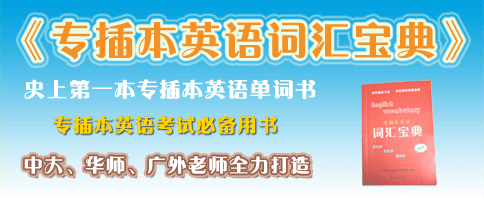2019年广东理工学院专插本商务英语考试大纲点击下载: 广东理工学院2019年专插本专业课考试大纲 (考试科目:商务英语) Ⅰ.考试性质 普通高等学校本科插班生(又称专插本)招生考试是由专科毕业生参加的选拔性考试。高等学校根据考生的成绩,按照已确定的招生计划,德、智、体全面衡量,择优录取。因此,本科插班生考试应有较高信度、效度、必要的区分度和适当的难度。 Ⅱ.考试内容及要求 总体要求:掌握并熟练使用综合商务英语课程1-2册教材中的英语常用词汇和必需的国际商务专业词汇及句型;能按照正常速度阅读并理解相关的商务报刊、杂志和文章;能听懂正常语速的商务听力资料;具备基本的商务翻译和口头表达能力;了解商务信函等各种文体的表达方式和特点,能适当地处理日常商务活动中的函电来往。同时,能通过教材掌握一定的商务通识,了解中西方不同的商务礼仪等跨文化交际知识,具备一定的商务实践技能,达到《高等学校商务英语专业本科教学质量国家标准》所规定的商务英语人才培养目标和知识与能力的要求。 第1册
第2册
Ⅲ. 考试形式及试卷结构 一、考试形式: 闭卷、笔试,考试时间为120分钟,试卷满分为100分。 二、试题题型及赋分:试卷包括客观性试题和主观性试题。客观性试题主要测试商务英语词汇、英语语法、完型填空、阅读理解等三个部分;主观性试题主要测试考生的句子转述能力、翻译能力和商务信函写作能力。 试卷结构
三、题型考查要求 第一部分:词汇与语法结构(Vocabulary & Grammar)(15%),每小题1分,本部分共15小题。 主要考查考生对商务英语词汇与英语语法知识的掌握情况。词汇考查学生认知并掌握一定数量的商务英语词汇、固定词组,了解词的不同级别以及搭配。语法考查学生掌握主谓一致;掌握各种时态、语态及用法;掌握动词不定式、分词、动名词的用法;掌握情态动词用法;掌握比较结构;掌握定语从句、状语从句等的用法;能正确使用虚拟语气和倒装结构;掌握复合句句型。 第二部分:完型填空(Cloze)(15%),每小题1分,本部分共15小题。主要考查考生理解短文并运用英语的能力,要求考生在全面理解所给短文内容的基础上选择一个最佳答案使短文的意思和结构恢复完整。 第三部分: 阅读理解(Reading Comprehension)(20%),每小题2分,本部分共10小题,20分。主要考查考生从阅读材料中获取信息并回答所附问题的能力。要求考生能读懂英美国家出版的中等难度的商务文章和材料,掌握所读材料的主旨和大意。要求考生根据所提供的2篇短文的内容,从每小题所给的4个答案选项中选出最佳选项。该部分主要考查:⑴ 根据上下文猜测某个词或词组的具体含义;⑵ 对文中某句话的释义或言外之意的理解;⑶ 寻找文中重要具体信息;⑷ 概括短文的中心思想、话题或合适的标题;⑸ 判断作者的态度,观点或者写作目的;⑹根据短文的内容进行推断。 第四部分:句子转述(Paraphrase)(15%),每小题3分,本部分共5小题,15分。要求考生能运用一定的转述技巧(同义词替换、变换句型等),用英文释义原句,保证转述后的句子在意义上与原文一致,且无语法错误。 第五部分:句子翻译(Translation)(15%),每小题3分,本部分共5小题,15分。其中,有3题为英译汉,2题为汉译英。要求考生能用词贴切,行文流畅,基本上无语言错误地准确表达原文的意思。 第六部分:商务写作(Business Writing)(20%)。要求考生根据题目要求,写一篇120-140字左右的商务信函,要求内容切题,完整,条理清楚,文章结构严谨,语言通顺恰当。 Ⅳ.题型示例 PART I VOCABULARY & GRAMMAR (15%,1’×15=15’) Direction: There are 15 questions in this part. For each question there are four choices marked A,B,C and D. Choose the one that best fits the question,and then mark the corresponding letter on the Answer Sheet. 1. The employee shows a great ______ for leadership. A. genius B. faculty C. skill D. aptitude 2. Australia consumer confidence ______ for the first time in seven months to 41.1 in January, from 40.1 in December. A. rise B. rose C. have risen D. will rise Keys: 1. D 2. B PART II CLOZE (15 %, 1’×15=15’) Direction: There are 15 blanks in the following passage. For each blank there are four choices marked A,B,C and D. You should choose the one that best fits into the passage, and then mark the corresponding letter on the Answer Sheet. The difference between _1___ a manager and being a leader is simple. Management is a career. Leadership is a calling. You don’t have to be tall, well-spoken and good looking to be a successful leader. You don’t have to have that “special something” to _2____ the leadership role. What you have to have is clearly defined convictions, and more importantly, the courage of your convictions to see them manifest_3____ reality. Only when you understand your _4____ as guide and steward based on your own most deeply held truths _5______ move from manager to leader. Whether the group you _6_____ is called employees, associates, co-workers, teammates or anything else, what they are looking for is someone in whom they can place their_7_____. Someone they know is working for the greater good --- for them and for the organization. They’re looking for someone _8______ that they can --- but that they want to--- _9______. Because it is only _10____ you have followers ---people who have placed their trust in you ---that you know you have moved into that leadership role. And _11_____ you see it is that your organization is transcending all previous quality, productivity, innovation and _12_____ achievements. You’re operating at such a high level of _13______ that you’re giving budget back to the corporation --- and you’re still beating your _14______ . You’re achieving _15______ you always dreamed could be achieved. And not only that, but it’s actually easier than you thought. 1. A. as B. be C. being D. / 2. A. achieve B. fulfil C. realize D. take 3. A. from B. as C. in D. into 4. A. status B. place C. role D. position 5. A. can you B. you can C. will you D. you will 6. A. see B. overlook C. look for D. oversee 7. A. trust B. belief C. credence D. trustworthiness 8. A. not B. not only C. nothing D. only 9. A. rely B. listen C. follow D. comply 10. A. when B. if C. then D. that 11. A. the way B.what C. which D. the means 12. A. remittance B.reverent C. revenue D. reparation 13. A. efficacy B. speed C. efficiency D. rate 14. A. goals B. bush C. aims D. destination 15. A. that B. which C. in which D. what KEYS: 1-5:CBDCA 6-10: DABCA 11-15: ACCAD PART III READING COMPREHENSION (20 %, 2’×10=20’) Direction: In this section there are two passages. Each one is followed by five questions or unfinished statements. Beneath each question or unfinished statement, there are four suggested answers marked A,B,C and D. Choose the one that you think is the best, and then mark the corresponding letter on the Answer Sheet. Passage One Questions 1 to 5 are based on the following passage. Research and Development in Industry It is only through innovation that large companies will be able to survive, according to Ron Misch, vice-chairman of UK-owned industrial giant 3M. However, says Misch, it remains difficult to run a truly innovative company. Innovation involves speculation, unproven technologies and unpredictable costs. It takes a lot of managing, because managers really have to be on top of what's happening. In addition, innovation does not fit easily into the orderly kind of organization that company accountants like. Despite this, Misch claims it is an essential policy to pursue. The 3M group's record of growth aiding profitability indicates that it manages the orderly part of the business pretty well. The statistics are big: operations in more than 60 countries, sales in more than 200, around 60,000 products and 70,000 employees. But what makes 3M different is its innovative approach to innovation itself. Although it is a massive multi-national with a turnover of $ 15 billion, the whole company is broken down into tiny groups which work together and help each other and are encouraged to consult internally with the other groups. This positively encourages individual and collaborative research. A further encouragement is that all research staff worldwide are expected to work on 3M projects for only 85% of their time; for the remaining 15% of time they are free to pursue ideas of their own, using company facilities. In this time they can work on their own or in a group. One hugely successful project that has come out of this 15% rule is the Post-it note. The idea came from an individual inventor and then, using the business skills of a large organization, was rapidly developed into a major product. The success of the Post-it note proves how profitable the innovative 15% rule can be. Ron Mitsch says innovation is at the heart of 3M. In 1996, more than 30% of sales were generated by products less than four years old. He says: "We almost always get into new markets through innovation. We're very good at adapting these innovations to lots of different markets so we have a high success rate. We take an idea and see how many applications it's got. Then we try to establish market dominance. We have a tremendous variety of technologies so we can adapt anything but we still need the original ideas to develop." This emphasis on innovation creates unusual stresses and strains and makes a company like 3M a difficult business to manage. Technical people at 3M are given a large degree of intellectual freedom, and the company appears to specifically try to recruit people who think for themselves and who don't necessarily solve things by the traditional routes. The management encourages people to step outside of the security that comes from working in a big, stable group, and then to handle the consequences. So far the mixture of freedom and heavy responsibility seems to work: the 25 research schemes now under review could generate business worth $ 6 billion a year. 1. Ron Mitsch says it can be difficult for companies to be innovative because this involves____ A. employing a lot of managers. B. giving more power to the accountants. C. being prepared to take risks. D. being orderly and organized. 2. 3M's approach to innovation is different because it allows researchers to _____ A. work for more than one company. B. work on a variety of products. C. work alone as well as in a team. D. work with groups in other organizations. 3. The writer says that the Post-it note was invented as a result of ______ A. a researcher's own initiative. B. research carried out by a group. C. research originally done on another product. D. a manager's innovative idea. 4. When 3M has a new idea it tries to _____ A. sell it only in new markets. B. think of different ways of exploiting it. C. sell it in markets it already controls. D. keep it secret as long as possible. 5. The researchers at 3M need to be people who _____ A. feel relaxed about their work. B. are willing to stay with the company for a long time. C. are academically gifted. D. have an individual approach to problems. KEYS: 1. C 2. C 3. A 4. B 5. D PART IV PARAPHRASE THE FOLLOWING SENTENCES (15 %, 3’×5=15’) Direction: Explain the following sentences in English and write the corresponding answer on the Answer Sheet. It takes you not only to your destination, but along the way to another world. KEY: It takes you not only to where you want to go, but gives you a glimpse of a colorful and diverse world. PART V Translation (15%, 3’×5=15’) Direction: Translate the following sentences into English or Chinese. 我国每年约有1300万的农村人口涌向城市,这个数字相当于现在整个北京市的人口。(flood) The middle class increasingly forgoes bicycles --- the environmentally friendly and energy-efficient transport--- in favor of the car. KEYS: 1. Every year, about 13 million rural people flood into China’s cities, equivalent to the current population of Beijing. 2. 越来越多的中产阶级放弃了自行车这种绿色环保﹑节省能源的交通工具,而选择购买汽车。 PART VI BUSINESS WRITING (20%) You are Gerry Shockley, an American businessman. You are planning a trip to Europe next week. This is your agenda: Dec.5 Thu. Arrive at Prague Dec. 6-8 Fri-Sun. Prague Fair Dec. 9-10 Mon-Tue. Meet Patrick Rogers in Frankfurt Dec.11 Wed. Meet Alan Milligan in Warsaw Dec.12 Thu. Leave Warsaw • Write a letter (120~140 words) to Patrick Rogers to arrange a meeting, telling him your agenda and that you want to discuss a possible agency agreement with him, and asking him to reserve a hotel room for you. Sample writing: Dear Mr. Patrick Rogers, I'm planning a trip to Europe next week. According to my agenda, I will arrive at Prague on July 5 to attend the Prague Fair. I intend to stay there for three days. Then I will fly to Frankfurt on July 9 and leave on July 11. I hope I can meet you in Frankfurt because I want to discuss a possible agency agreement with you. Would you please make a good preparation for the coming meeting so that we can have a negotiation in depth? By the way, would you please do me a favor to reserve a hotel room for me? Please contact me before my departure if you have any question. Yours faithfully, Gerry Shockley 写作评分标准:
Ⅴ.参考书目 商务英语综合教程1(第二版)学生用书,王立非,上海外语教育出版社2017年9月出版,9787544646505 商务英语综合教程2(第二版)学生用书,王立非,上海外语教育出版社2018年7月出版,9787544651905 |
||||||||||||||||||||||||||||||||||||||||||||||||||||||||||||||||||||||||||||||||||























